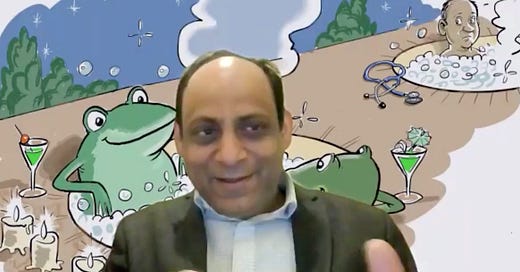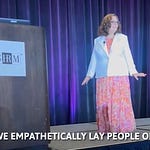AI Transcript from the Webinar
Quick recap-The meeting focused on the importance of self-awareness, mindfulness, and emotional intelligence in managing stress and promoting resilience. The discussion also covered the impact of stress on mental and physical health, the role of self-accountability and self-discipline in achieving personal goals, and the concept of the "Jacuzzi effect" in enhancing self-care activities. The conversation ended with a discussion on the difference between stress and trauma, and the importance of time management as energy management for maintaining a healthy work-life balance.
Next steps• Implement micro-positive actions to counteract micro-stressors in daily life.• Focus on developing emotional intelligence and authentic communication in the workplace.• Apply the concept of energy management instead of traditional time management.• Practice self-reflection to identify personal stressors and strengths.• Review and apply the concepts discussed in Dr. Ash's book on stress management and the "Jacuzzi effect".
Summary
Chronic Stress and Brain Function-In the meeting, Dr. Ash discussed the concept of chronic stress and its effects on individuals, likening it to the boiling frog analogy. He emphasized the importance of self-awareness and boundaries in recognizing stressors in the environment. Dr. Ash also explained the roles of the right and left hemispheres of the brain in managing stress, with the right hemisphere involved in creativity, emotions, and self-awareness, and the left hemisphere in planning, logic, and execution. He highlighted the significance of the prefrontal cortex, which can be negatively affected by prolonged stress, leading to dysregulation of the limbic system and potential chaos. The conversation ended with a discussion on the impact of stress on memory, specifically mentioning the hippocampus.
Mindfulness and Emotional Awareness in Stress-Alexia and Dr discussed the importance of mindfulness and emotional awareness in managing stress and promoting resilience. Alexia emphasized the need to be present in the moment, aware of one's thoughts and emotions, and to take breaks to prevent burnout. Dr explained that mindfulness helps to stay in the present moment, away from past regrets or future anxieties, and that it can be practiced through deep breathing and naming one's emotions. They also touched on the importance of emotional intelligence, which involves being comfortable with one's emotions and being able to recognize and regulate them.
Managing Stress for Well-Being-Dr. discussed the importance of managing stress, highlighting that high levels of stress can negatively affect the prefrontal cortex and lead to emotional dysregulation, mental health issues, and physical diseases. He emphasized that stress management is crucial for overall well-being and can even help reverse conditions like diabetes. Alexia then shifted the discussion to understanding individual stress tolerance and optimal performance levels, using the boiling frog framework as a guide. The team agreed on the need for self-reflection and awareness to determine the right amount of stress for each individual.
Mindfulness and Self-Reflection in Coaching-Alexia discussed her recent experience with a heart scan and how it made her realize the importance of self-reflection and mindfulness. She shared how she had been struggling with stress and heart rate issues, but had made an adjustment to practice more mindfulness and coping strategies. Dr emphasized the role of a trusted coach or friend in helping others see their blind spots and grow. He also highlighted the importance of starting with one's strengths, as per Gallup's 34 skills, and how a coach can guide in identifying these strengths and blind spots.
Self-Accountability and Stress Management-Dr. discussed the importance of self-accountability and self-discipline in managing stress and achieving personal goals. He emphasized the need to avoid blame and excuses, and to take full responsibility for one's actions. He also highlighted the challenges of living in a world with an abundance of information and the need for focus and attention to make meaningful changes in life. Alexia agreed with Dr.'s advice to be mindful while engaging in activities, especially driving, and to limit distractions to avoid negative consequences.
Emotional Intelligence and Mental Well-Being-In the meeting, Dr. discussed the importance of emotional intelligence and its impact on our well-being. He explained that emotions have frequencies and that a balance of positive and negative emotions is crucial for mental health. He cited the work of Barbara Fredrickson, who suggests that a 1:1 ratio of positive to negative emotions is necessary for survival, while a 3:1 ratio leads to thriving. Dr. also shared his personal experience of dealing with high levels of stress and how he adapted to the situation by focusing on hope and purpose. He emphasized the importance of making choices in response to challenging situations and shared examples from the books "Man's Search for Meaning" by Viktor Frankl and "The Choice" by Edith Eger.
Managing Stress and Energy for Productivity-Alexia and Dr discussed the importance of managing stress and energy to prevent burnout. They emphasized the need to align with one's core values, strengths, and energy levels to achieve productivity and happiness. Alexia suggested reflecting on what fuels and drains her energy, while Dr recommended using tools like the Clifton Strengths Finder, VIA character strengths, and the MBTI personality inventory to better understand oneself. They also highlighted the importance of delegating tasks to those with complementary strengths. The conversation concluded with the importance of investing time in understanding one's strengths and how to work together as a team to enhance productivity and creativity.
Managing Micro-Stressors and Psychological Safety-Dr. discussed the concept of "boiling frogs" to illustrate the impact of stress on individuals. He explained that stressors, like a frog in boiling water, can gradually wear down a person's mental and emotional well-being. Dr. emphasized the importance of recognizing and managing micro-stressors, which can accumulate and have a significant impact on one's life. He suggested leveraging strengths, values, and connections to counteract these stressors. Alexia agreed, noting the need for intentional focus on strengths and values to maintain psychological safety and purpose. Dr. concluded by acknowledging the time constraint and promising to answer Alexia's question about his background.
Exploring Self-Care and Work-Life Balance-Inthe meeting, Dr. Ash discussed the concept of the "Jacuzzi effect," which refers to the synergy and connection that can be experienced when engaging in self-care activities, such as taking a relaxing bath. He emphasized the importance of self-care and reflection in maintaining a healthy work-life balance. Dr. Ash also shared his personal journey of choosing not to pursue a career in medicine due to the high burnout rate among doctors. He encouraged the participants to consider time management as energy management and to prioritize their own well-being. The conversation ended with a discussion on the difference between stress and trauma, with Dr. Ash explaining that trauma is an event that can cause stress and related illnesses, but can also lead to post-traumatic growth.
Dr. Ash Kumar, MD, MBA, is a renowned physician, author, and stress management expert. With a unique approach that bridges Western medicine and Eastern spirituality, Dr. Kumar has helped individuals and organizations achieve resilience and well-being. He is the author of The Boiling Frog, a transformative guide to managing chronic stress and thriving in a high-pressure world. Through his books, video courses, and coaching programs, Dr. Kumar empowers people to lead healthier and more intentional lives.
Order Dr. Ash's book and workbook today:
THE BOILING FROG: 21 STRATEGIES TO TRANSFORM STRESS INTO STRENGTH & COMFORT








Share this post